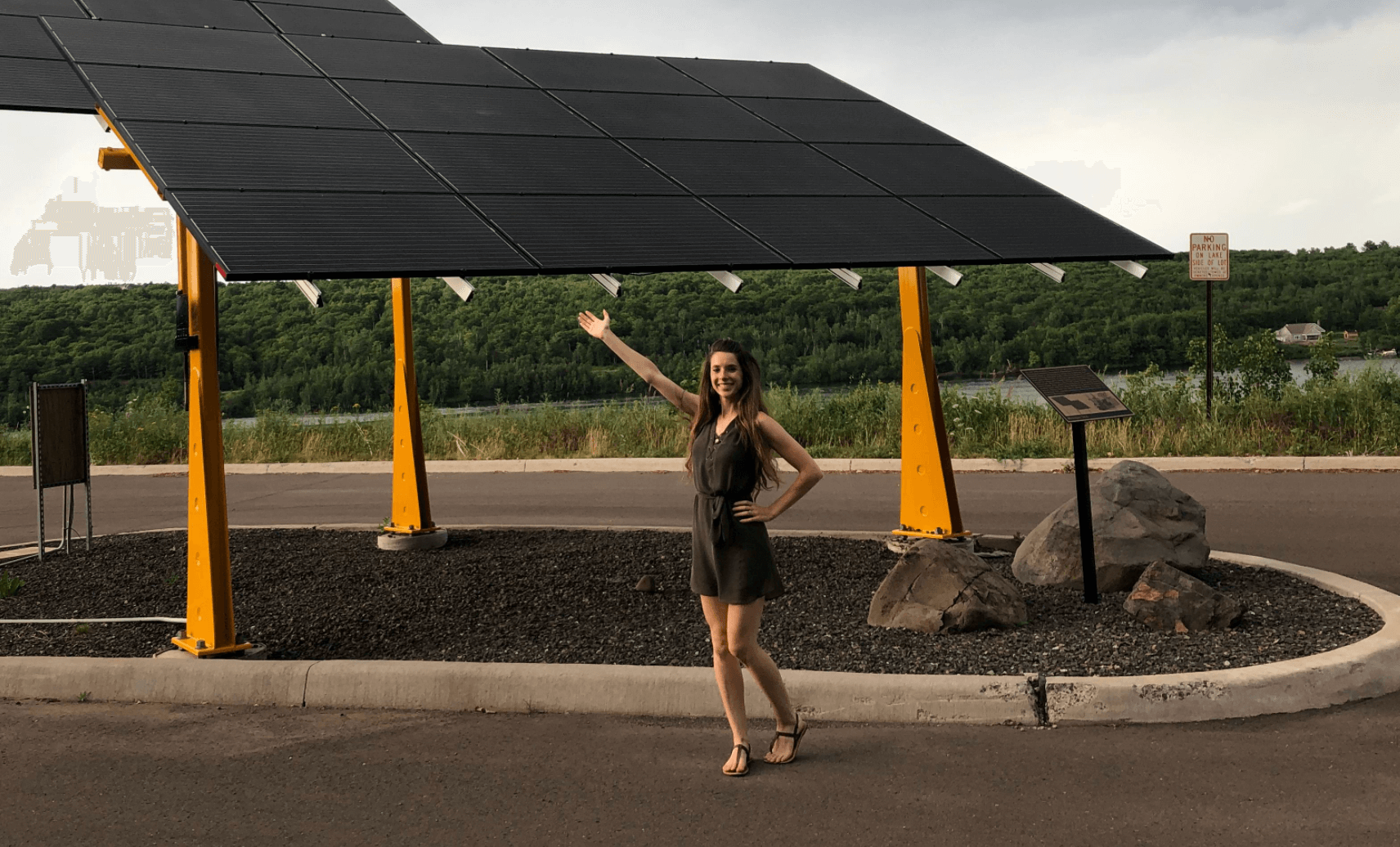“At Michigan Tech, we don’t just talk about sustainability, we incorporate sustainability in all aspects of the educational experience,” said Audra Morse, chair of the Department of Civil and Environmental Engineering at Michigan Technological University.
Morse points to environmental engineering student Rose Turner, who followed her passion for sustainability by joining Michigan Tech’s Alternative Energy Enterprise soon after she joined the university.
There are 24 Enterprise teams on campus, each working on real projects for real clients.
“They invent products, provide services, and pioneer solutions. It’s an award-winning program entirely unique to Michigan Tech, and it provides an absolutely invaluable experience for our students,” said Morse.
Self-sustaining homes and solar farms: Student projects that make a real-world difference
Turner and fellow team members retrofitted an existing 5,000 square foot house on Michigan Tech’s campus, turning it into a net-zero energy, self-sustaining home.
Named the Michigan Tech Sustainability Demonstration House, it now provides students with first-hand experience in designing systems to reduce the use of energy, water and water in homes.
Due to her hard work and dedication, Turner was selected to live there, serving as house coordinator. Her role was to identify and launch internal projects, plan public outreach events, and seek donations and sponsorships from companies.

Rose Turner: Source: Michigan Tech
“Michigan Tech equipped me with tools, resources, and knowledge,” she said. “I was able to design and construct an aquaponics indoor gardening system, a raised-bed outdoor garden, and a smart rainwater collection and distribution system — all for the house.”
Taking her environmental engineering education further, Turner won a summer internship at Westwood Professional Services, an environmental engineering consulting firm. As an intern, she designed multi-megawatt commercial solar and wind farms across the US, including a 15 MW solar farm in Ulupalakua, Hawaii.
“It was incredibly rewarding to have an opportunity to design clean energy systems to help power our country,” said Turner.
Turner learned about the internship through Michigan Tech Career Services, meeting up with representatives from Westwood for an interview right on campus. Her internship also led to a full-time role there, working on Environment, Great Lakes, and Energy permits for a 300 MW wind farm design for Isabella County, Michigan.
“Michigan Tech’s Career Services does more than help students find a job, they help us find and launch our careers,” said Turner.
She recently returned to campus to earn an MS in Environmental Engineering. Her goal is to pursue a PhD or work in industry. “Either way, I am looking forward to using my sustainability knowledge to make a difference,” she said.
Where sustainability is central to your studies
The “Sustainability and Civil Engineering Practice” course is essential to Michigan Tech’s civil engineering program.
This course introduces students to the tools that engineers use in sustainable design such as “LEED” and the Institute for Sustainable Infrastructure Envision “rating tool,” as well as state-of-the art sustainability practices in design and construction.
Sustainability also serves as the cornerstone of Michigan Tech’s environmental engineering degree program. Professor Judith Perlinger teaches “Sustainable Engineering,” another course that plays a vital role in the curriculum.
“Students learn about the triple bottom line, the consideration of profit, people, and the planet, and essential tools they’ll use to advance sustainability from a systems approach,” said Perlinger.

Judith Perlinger. Source: Michigan Tech
All courses in both programs include important sustainability components, Morse added.
“But the true strength of a Michigan Tech education is the solid foundation in engineering and science. This knowledge is what allows for the incorporation of sustainability in design.”
Sierra Braun, a senior completing her Bachelor of Science in Civil Engineering, jumped at the opportunity to make sustainability in design come to life.
She joined the Green Campus Enterprise, which focuses on reducing the university’s carbon footprint, when she heard they were planning planned to design and build a tiny house.
“Not only has it allowed me to explore my passion of design and construction, I am able to build a tangible example of sustainability right on our campus through the Tiny House Build project.”
Braun and her fellow team members analyzed sustainable design practices for maximizing thermal performance during the design phase of the Tiny Build project. In construction, they’ll optimize materials to reduce global warming potential. They also seek to increase longevity and minimize environmental impact.
Undergraduate research opportunities like no other
Undergraduate research is another learning opportunity at Michigan Tech.
In the Sustainable Pavement Lab, directed by Professor Zhanping You, students conduct research to find out if traditional asphalt mixed with rubber from scrap tires could make better roads.
Students test recycled asphalt materials to maximize the recyclability of materials, work with biomass to produce variations of a new asphalt-like material called bio asphalt, and use recycled waste — plastics and glass— in other road applications.
They work in labs and in the field at road construction sites in Michigan collecting data and evaluating material field performance.
Many graduates continue their work in Dr. You’s lab while earning their graduate degree at Michigan Tech or other institutions. Others go on to work in the transportation industry, applying sustainability practices in their job each day.
“Working in Dr. You’s lab has allowed me to understand the bigger picture, and be part of it, too,” said civil engineering major Kagan Griffith.
“This applies to the natural world and the engineered materials we combine to advance society. As we move forward in time, I’ve learned the importance of using new technology —and new understanding — to construct the built world in a safe and sustainable way.”
As for Turner, she is now working to create an even greater shift towards sustainability on campus:
“I have a very strong desire to reduce the production of waste, so one of things I’ve been doing lately is to work with a group of fellow students to establish a full recycling programme for our residence halls.”

Rose Turner: Source: Michigan Tech
So, do engineers save the world?
“Absolutely,” said Turner, “Michigan Tech has truly helped to cultivate my love for the earth and my passion for educating others on the importance of sustainability in daily life.
“I will forever be grateful for the plethora of sustainability-related opportunities I’ve experienced at Michigan Tech — as well as the freedom the university has given me to make my dreams a reality.”
Michigan Tech is taking all precautions necessary to keep their community safe from the threat of COVID-19.
For the latest updates, please visit the MTU Flex website.
Follow Michigan Tech on Facebook, Twitter, LinkedIn, Instagram, YouTube, Pinterest and Snapchat
Liked this? Then you’ll love…
US Engineering schools that drive sustainability forward
Charles Darwin University: At the forefront of sustainability











